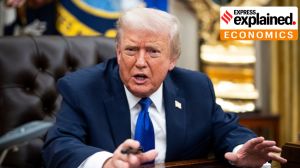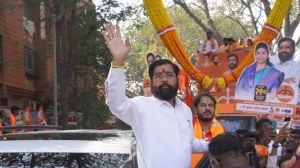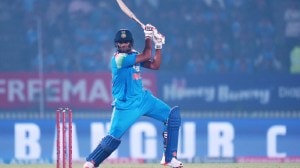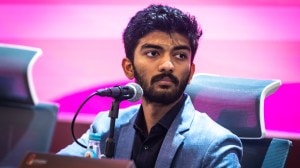Crossing boundaries
I have been to Pakistan many times, and each time I have strongly felt that the common Pakistani nurtures no animosity towards Indians. But ...

I have been to Pakistan many times, and each time I have strongly felt that the common Pakistani nurtures no animosity towards Indians. But I also know how cricket matches have long been considered a proxy war between the two neighbours and how one-day encounters have brought out the worst jingoism in both the crowds.
So the recent visit to Karachi, to witness the historic resumption of Indo-Pak cricketing ties, was a pleasant surprise. More so because the city in question was Karachi, which, till March 10, evoked ugly memories of crowd disturbance. I was not surprised when a day before the first match, a concerned security officer requested me to leave the stadium at least half-an-hour before the match ended. He reminded us that Karachi has always been very volatile, with a very low tolerance level, and if Pakistan lost there was every possibility of a riot.
As we all know, cricket couldn8217;t have been more nail-biting than that day8217;s match, and at the end of it all, Pakistan was the loser. And no , we didn8217;t leave the ground early. When Zaheer caught Moin Khan of Ashish Nehra, the crowd went silent for a while, and then gave a standing ovation to Saurav Ganguly and his men. Most of them even stayed back for the post-match function to cheer Inzamam, as well as the winners. Every time an Indian played a good shot, took a good wicket or spectacular catch, the crowd applauded. Sure they were supporting Pakistan, but not at the cost of the game.
Even after the match, the city went about its daily routing. No stone-pelting 8212; otherwise a routine way of venting frustration in the sub-continent 8212; was recorded. About 8,000 Indians who went to Karachi for the match were given the royal guest treatment. They were congratulated by every Pakistani they met in the hotels, restaurants and on the roads after the match. The Indians moved around freely and shopped to their heart8217;s content. Not a single incident of harassment was reported. The Pakistani administration went out of its way to ensure that everything went well. And when it came to the VVIPs 8212; Priyanka, Rahul and Robert 8212; they just didn8217;t take any chances. The young Gandhis, for example, were offered State security with commando cover, and traffic management was exemplary when their cavalcade moved.
In fact, the change in mindset was visible even on the field. Even the fiery Shoaib Akhtar was restrained in his show of aggression after scalping wickets. Why, even Yusuf Yohana and Moin Khan were unusually sober in both the matches. While the Indians were understandably a little uneasy about the security aspect before the tour, they could brush off their anxiety very soon into the tour, thanks to excellent arrangements and the tangible warmth all around.
It may be a bit premature, but this series seems to have already overtaken official diplomacy in bringing the two governments closer. Now, the respective leaderships must grab the initiative and take immediate and concrete steps to formalise ties. If we don8217;t act now, the mutual goodwill generated by this series may lose its impact. We have to strike while the iron is hot, and liberalising trade relations should be the natural progression.
Temple talk
I have seen a number of locked temples in Lahore and Rawalpindi. Locked for the last 55 years with nobody allowed inside to offer prayers. But a visit to the Karachi port temple 8212; Meghghat 8212; came as a surprise. This 1932 temple was bustling with activity. Dedicated to Shiva and Krishna, Meghghat looked like any other temple in India. There were over 200 devotees thronging the compound 8212; singing, dancing, chanting mantras and distributing prasad. In contrast to other big Pakistani cities, Karachi has a comparatively large Hindu population and less animosity towards religious minorities. One reason could be that migrants to Karachi took a ship, and not the horrifying train journey back home.
Right choice
The arrival of new US ambassador David Malford in New Delhi promises to bring about a big improvement in the trade relations between the two countries. Malford specialises in finance and commerce and is keen to enhance trade between US and India. A non-career diplomat, Malford is the personal choice of President George Bush and Secretary of State Colin Powell. Recently, as the convener of the Indo-US Parliamentary Forum, I had the opportunity to hear his views 8212; right from outsourcing to bilateral relations to trade to Indo-Pak relations. It appears to me that he is the right choice for the right slot.
Whose Emergency
Name one BJP leader who is not critical of the Emergency and doesn8217;t attack the Congress on this count. Chances are that you can8217;t. Someone as senior as Deputy Prime Minister L K Advani calls it the 8216;8216;dark era8217;8217;, a 8216;8216;nightmare8217;8217; and a 8216;8216;curse for democracy8217;8217;. But the desperation to garner whatever support available can often blur political lines and even so-called party stands. So, the same BJP is happy showcasing three of the most prominent players of Emergency as the party8217;s assets. V C Shukla, Jagmohan and Maneka Gandhi 8212; three key advisors of Sanjay Gandhi 8212; are placed, quite happily, in the BJP today. One can only hope that the party will now stop its anti-Emergency rhetoric. Going back to my original question, at least we will now have three BJP leaders who can8217;t possibly criticise their own doings. But in politics, you can never be sure.
The writer is a Congress MP
- 01
- 02
- 03
- 04
- 05































